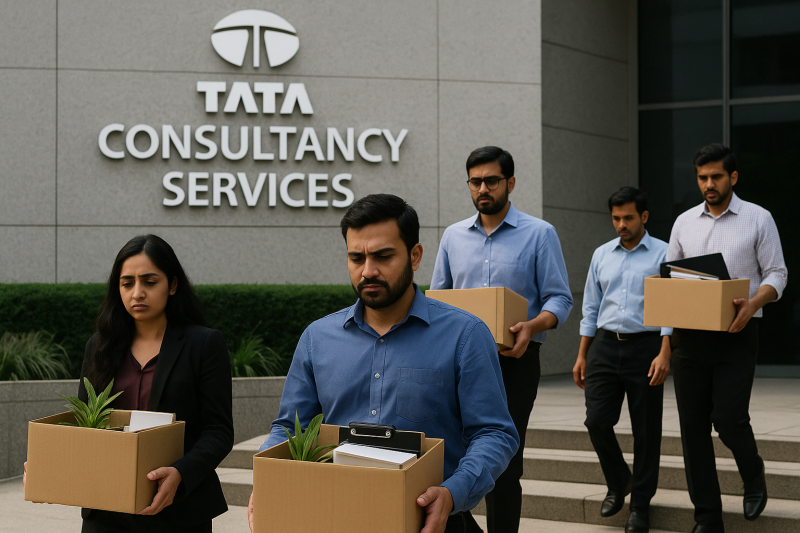Tata Consultancy Services (TCS), India’s largest private-sector employer, has made its deepest job cuts ever as the country’s $280 billion IT services industry braces for disruption from artificial intelligence and geopolitical headwinds.
The company’s workforce fell below 600,000 for the first time since 2022 after it shed 19,755 employees in the quarter ended 30 September — a mix of layoffs and voluntary exits.
The restructuring, which comes with a ₹11.35 billion ($128 million) severance cost, marks a turning point for an industry long defined by job creation and outsourcing strength.
TCS makes record workforce cuts amid skill realignment
The company’s headcount dropped 3.2% from the previous quarter, Bloomberg reported, citing the company’s latest financial disclosures.
The reduction is part of a broader plan to cut around 2% of the workforce by March next year, primarily targeting middle and senior-level employees facing a “skill and capability mismatch” as the firm pivots toward generative AI and automation.
Chief Human Resources Officer Sudeep Kunnumal said the company is about halfway through this restructuring exercise and will continue to hire staff with “future-relevant skills.”
TCS’s severance provisions, which include notice pay and compensation ranging from six months to two years depending on tenure, have been extended to both project-bench staff and long-serving veterans nearing retirement.
Despite official statements downplaying the scale of involuntary exits, the move has triggered scrutiny from employee advocacy groups.
NITES, a labour body representing IT professionals, alleged that the actual number of terminations was higher than what the company disclosed, claiming over 8,000 forced exits in addition to those reported.
The layoffs, alongside the one-time severance charge, weighed on TCS’s quarterly profit, which missed analyst expectations.
Citi analysts said the workforce reduction signals broader weakness in business demand and slower spending among clients navigating their own AI transitions.
TCS doubles down on AI infrastructure and data investments
While shrinking its workforce, TCS is ramping up investments in next-generation infrastructure.
The company has announced plans to build a 1 gigawatt sovereign co-location AI data centre in India, with a projected investment of $6.7 billion over the next five to seven years.
The facility will anchor TCS’s growing focus on data processing, AI training models, and cloud computing capacity for enterprise clients.
The firm also acquired US-based ListEngage for $72.8 million to strengthen its Salesforce and customer relationship management (CRM) solutions, a deal that aligns with its digital transformation ambitions.
To consolidate these efforts, TCS has established a new Artificial Intelligence and Services Transformation Unit, led by senior executive Amit Kapur, aimed at integrating AI tools across operations and client solutions.
Industry analysts view the pivot as a strategic necessity to stay competitive, but warn that AI infrastructure is capital-intensive and could compress margins.
The challenge for TCS, and for India’s IT sector more broadly, lies in balancing long-term innovation with short-term profitability amid global economic uncertainty.
US policy and visa curbs threaten outsourcing stability
The transformation comes as Indian IT firms face heightened uncertainty in their largest market — the United States.
President Donald Trump’s administration has moved to tighten H-1B visa rules, a cornerstone of India’s IT export model, while introducing tariffs on Indian goods.
In response, TCS has accelerated local hiring in the US to reduce dependence on visa holders.
The company said its business model is designed to adapt to changing immigration policies, emphasising localisation and skill diversification.
Adding to the pressure is the proposed HIRE Act 2025 in the US Congress, which could impose a 25% tax on payments made to foreign service providers and remove tax deductions for US companies outsourcing work abroad.
Analysts warn that such measures could erode the cost advantage that made India’s IT industry globally dominant since the 1990s.
The combination of automation, AI adoption, and shifting global trade dynamics marks a structural change in how Indian IT firms operate.
For TCS, once a symbol of steady job growth, the record job cuts signal an inflection point — one where adaptation, rather than expansion, will define the next chapter of the country’s tech story.
The post What job cuts at India’s TCS means for the country’s $280B IT industry appeared first on Invezz


